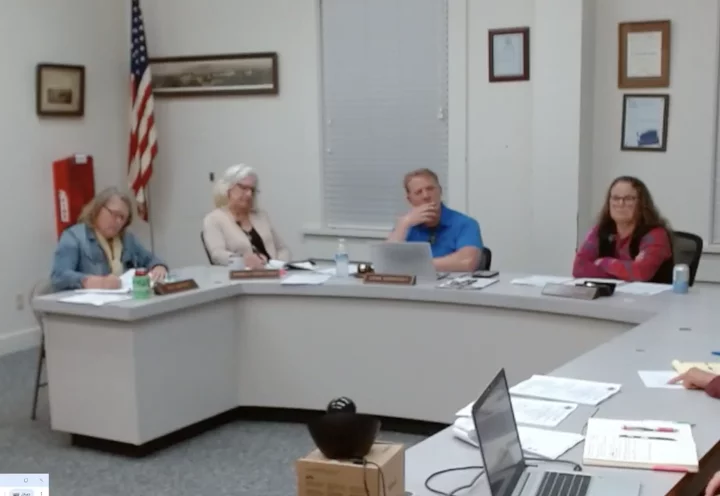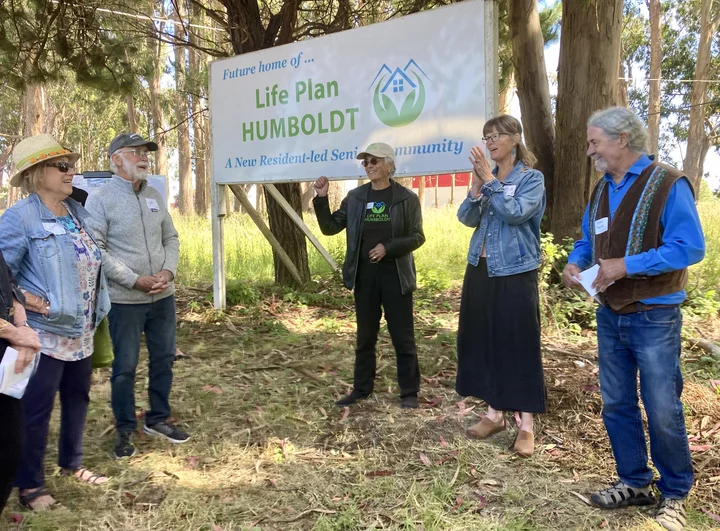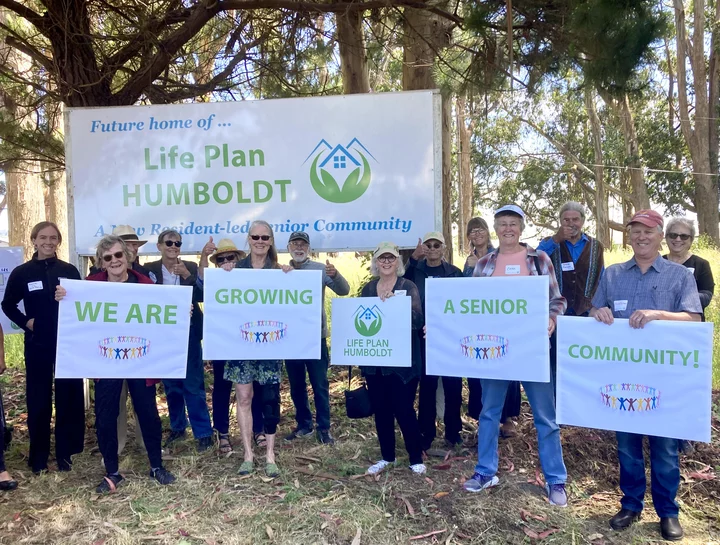Control of KHSU Will Return to Cal Poly Humboldt by the End of This Year
LoCO Staff / Saturday, June 28 @ 6:29 a.m. / KHSU
PREVIOUSLY
- (UPDATE) Humboldt State Announces the Evisceration of KHSU
- Last Remaining KHSU Employee Quits; Estrada Says She ‘Will Not Be Buried’
- As Sort of Expected, Humboldt State Hands KHSU Programming Over to Capital Public Radio
Control of KHSU, for the last four years managed by CSU Sacramento NPR affiliate CapRadio, will be returning to Cal Poly Humboldt by the end of this year. Control of NSPR will also return to Chico State University.
CapRadio has controlled the day-to-day operation of KHSU since 2021, when they obtained the managing agreement from Humboldt State University. The news broke June 18, when CapRadio’s Interim General Manager and President Frankie Maranzino announced the change after a monthly board meeting was postponed. (It’s now scheduled for July 2 at 5:30 and is open to the public.)
CapRadio’s chief marketing and revenue officer, Chris Bruno, said it’s a money-saving “business decision.”
“Our goal at the end of the day is to think about how we can be good partners and work collaboratively to transition operations back to the universities,” Bruno told CapRadio reporters in a briefing last month. “Our goal is to think about the future and the opportunity for CapRadio to operate sustainably and position ourselves for growth.”
CapRadio has struggled to stay solvent and has been accused of mismanaging funds. An audit done this year by the Corporation for Public Broadcasting (CPB) found that CapRadio reported earnings over three years of almost $6 million that didn’t exist. Now, the CPB wants $200,000 from CapRadio to repay CPB grants.
In January, CapRadio sued its former general manager Jun Reina for embezzling over $370,000, accusing him of using CapRadio’s funds to cover personal expenses such as family vacations and golf course fees.
Bruno also claimed that CapRadio had lost over $280,000 running KHSU and NSPR the first two months of this fiscal year.
Representatives from Cal Poly Humboldt and Chico State shared this statement with employees on June 18:
As CapRadio shared with employees today, Chico State and Cal Poly Humboldt are in discussion with the organization to transfer the current operating arrangements of NSPR and KHSU back to our respective campuses. We are all committed to building a strong, sustainable future for local public media so that the stations remain trusted and reliable news sources for our Northern California and North Coast communities. We will ensure broadcasting continuity throughout the process. We look forward to sharing more details after the budget vote on July 2 and continuing discussions among the three university partners and license holders, Sacramento State, Chico State, and Cal Poly Humboldt.
Full article and reporting from CapRadio’s Chris Nichols and Sarit Laschinsky.
BOOKED
Today: 5 felonies, 12 misdemeanors, 0 infractions
JUDGED
Humboldt County Superior Court Calendar: Today
CHP REPORTS
Us101 / Fred Height Dr (HM office): Trfc Collision-No Inj
1500 MM36 E HUM 15.00 (HM office): Assist with Construction
Hayfork (RD office): Assist with Construction
ELSEWHERE
RHBB: Bridge Fire 60% Contained Now
Governor’s Office: Acting Governor Eleni Kounalakis proclaims Disability Pride Month
Governor’s Office: $35 million to law enforcement partners to keep communities safe from impaired driving
Times-Standard : Wildfires | Butler Fire flares to more than 2,000 acres; SoHum’s Bridge Fire 60% contained
Another Arrest Made in Arcata Burglary Case
LoCO Staff / Friday, June 27 @ 4:23 p.m. / Crime
PREVIOUSLY:
Arcata Police Department press release:
On June 26, 2025, at 4:30am, Arcata Police Officers interrupted a residential burglary in the 400 block of Shirley Boulevard. Three suspects fled on foot and the incident concluded with one suspect in custody after a foot pursuit.
APD Detectives identified an additional suspect as 47-year-old Arcata resident, Alvar Shane Sovereign. At 10:00pm that evening, APD Detectives conducted a traffic stop on a vehicle driven by Sovereign in the 1100 block of Spear Avenue in Arcata. Sovereign was arrested without incident for the burglary and fresh charges for felon in possession of ammunition, possession of methamphetamine, and possession of drug paraphernalia.
A search warrant was served on a residence associated with Sovereign located in the 1100 block of Madrone Avenue in Arcata. The search yielded a firearm and methamphetamine. Sovereign was booked and lodged at the Humboldt County Correctional Facility on an additional charge of felon in possession of a firearm.
APD continues to work toward the identification of any outstanding suspects and encourages anyone with information to contact the Arcata Police Department’s Investigations Unit, at 707-822-2424, or the Anonymous Crime Tipline, at 707-825-2588.
State Threatens Blue Lake With Hefty Fines and Legal Action for Failure to Adopt a Compliant Housing Element
Ryan Burns / Friday, June 27 @ 3:14 p.m. / Housing , Local Government , Sacramento
The Blue Lake City Council, which is down to four members following last month’s abrupt resignation of Chris Firor. | Screenshot from Tuesday’s meeting.
PREVIOUSLY
- Flouting State Guidance, Blue Lake City Council Votes Not to Adopt Its Own Updated Housing Element
- SERVED: Three Blue Lake Council Members Were Handed Recall Notices at Tonight’s Meeting
- Blue Lake City Council Approves Nine-Month Timeline to Reach Compliance With State Housing Law
###
California’s Department of Housing and Community Development (HCD) is losing patience with the City of Blue Lake.
Earlier today that agency issued a letter to Acting City Manager Dani Burkhart rejecting the city council’s previously proposed nine-month timeline to adopt an updated housing element that complies with state law.
The city spent years drafting a housing element update that meets statutory requirements, but in March the current iteration of the city council elected not to adopt it. Members of the 3-2 voting majority voiced skepticism about the city’s development plans generally and a mixed-use Danco project in particular.
Today’s letter from HCD notes that Blue Lake is in violation of state law and says, as a result, the city has lost eligibility to receive a variety of state funds, including permanent local housing funds, infill infrastructure grants, Caltrans sustainable communities grants and more.
The letter also warns of additional financial and legal ramifications. Specifically, Blue Lake could face fines of $10,000 to $100,000 per month for “persistent noncompliance” with state law, with even steeper penalties possible if the state decides to sue.
“Other potential ramifications could include the loss of local land use authority to a court-appointed agent,” says the letter’s author, HCD Assistant Deputy Director of Local Government Relations and Accountability David Zisser. Jurisdictions that don’t have compliant housing elements are subject to the so-called Builder’s Remedy, which effectively takes away a jurisdiction’s ability to deny any very low- to moderate-income housing and emergency shelter developments that comply with state law.
The letter arrives just three days after the Blue Lake City Council agreed to very slightly shorten its timeline for adopting an updated housing element and completing the necessary rezones. The previously approved timeline was to complete the former task by Dec. 31 and the latter by no later than Feb. 28, 2026. However, HCD wasn’t satisfied by that plan, as the agency made clear in a previous letter, issued on April 30.
“HCD is requesting the City provide a revised and specific timeline for (1) completing necessary rezones, (2) submitting an updated draft housing element, and (3) obtaining compliance with Housing Element Law no later than May 30, 2025,” that letter said.
At Tuesday’s meeting, the council approved a slight modification, promising to get both tasks completed by Dec. 15 — roughly two weeks earlier than previously promised for the housing element and two and a half months earlier for the rezoning.
Asked to comment on today’s letter from HCD, Blue Lake Mayor John Sawatzky emailed a written statement saying that the council’s actions on Tuesday “reaffirmed its commitment to achieving compliance with state housing mandates.”
He added that the council authorized staff to seek clarification from HCD on some technical issues, such as the city’s electronic sites inventory, which could allow the process to proceed “more efficiently.”
Sawatzky also suggested that this latest letter from HCD could have been “part of an automated notification [system],” adding, “we are seeking clarification on that detail.”
Reached by phone, City Councilmember Elise Scafani said that in the past, HCD has been very quick to respond to communications from staff, “So I’m a little concerned that [maybe] they don’t have our revised timeline,” she said. Scafani was under the impression that the revised timeline would allow HCD enough time to review and certify the updated housing element and rezones before the end of the calendar year.
“I think that [new timeline] was a good answer to their request,” Scafani said. “That’s why we picked that date.” At Tuesday’s meeting, Blue Lake City Planner Gary Rees, of SHN Consulting, said that after reaching out to HCD for clarification, agency staff said they wanted the city to move up its timeline for both items (the housing element update and the rezoning) by a month or two, minimum.
Four years ago, Blue Lake received $65,000 through the state’s Local Early Action Planning Grant (LEAP) program, and Scafani said the terms of that grant required the city to use that money to complete its 6th cycle housing element update by the end of the year.
Housing elements are a required component of each local jurisdiction’s general plan, which must be updated periodically to comply with state law. Housing elements in California must be updated every eight years, and they have to show how the local government plans to accommodate its fair share of regional housing needs across income levels, from very low to above moderate. For this latest planning cycle (the 6th), Blue Lake has been tasked with planning for 34 new dwelling units in its updated housing element.
Scafani said it’s possible that the city could adopt that housing element update and complete the required rezoning ahead of schedule — perhaps by October or November.
“The council is working hard to get all the work done,” she said, and she compared the municipal workload to drinking from a firehose. “We’ve been doing that for months now, and we’re just trying to stand up under the pressure.”
###
DOCUMENT: HCD Letter “Blue Lake Noncompliant”
Major Funding Secured for the Mile-Long Highway 101 Tunnel That Will One Day Bypass Last Chance Grade
LoCO Staff / Friday, June 27 @ 2:54 p.m. / Traffic
An early rendering of the Last Chance Grade bypass tunnel | Caltrans
PREVIOUSLY:
From the Office of Senate President Pro Tempore Mike McGuire:
In a major milestone for the community of Del Norte, Senate President pro Tempore Mike McGuire and Assemblymember Chris Rogers announced a $40 million investment approved by the California Transportation Commission today to jumpstart the design phase of the long-awaited Last Chance Grade Project.
For decades, a 3-mile segment of Highway 101, just south of Crescent City, has been in a losing battle with the elements—with some of the most geologically unstable soil on earth crumbling, sliding, and washing away during heavy winter storms. As the lifeline that connects Del Norte County to rest of the state, this decades-long repair project is a critical economic investment for the North Coast.
Today’s $40 million state allocation, which will kick off the design phase of the project, builds upon the $50 million Senator McGuire already fought to secure to successfully complete the project’s environmental review. The state’s massive investment today marks a pivotal step toward a permanent fix for the landslide-prone section of highway.
Caltrans District 1 will now formally begin designing a new 6,000 foot tunnel that will bypass the unstable stretch of earth entirely, realigning Highway 101, and delivering the long-term solution this region has waited decades for. Once complete, it will be the longest tunnel in the state.
“Four words sum it up: It’s about damn time. This $40 million is a turning point for the project and will formally kick off the design phase of the 6,000 ft. tunnel through Last Chance Grade, finally delivering the secure route on Highway 101 that the North Coast deserves,” Pro Tem Mike McGuire (D-North Coast) said. “We’re so grateful for the partnership with city, county, and tribal leaders, local environmental groups, and the California Transportation Commission, who continue to work together to make the North Coast stronger and more disaster-ready for decades to come.”
“The restoration of the Last Chance Grade corridor doesn’t just provide more reliable transportation for this area, it also supports economic resilience and ensures our communities maintain access to essential services, even during emergencies,” said Assemblymember Chris Rogers (D-Santa Rosa). “I want to give a big thank you to Pro Tem McGuire and Congressman Huffman for their partnership in securing this $40 million down payment for connection and reliability in Del Norte County.”
Senator McGuire, alongside a powerful coalition of North Coast and tribal leaders and environmental groups, has been a driving force for the Last Chance Grade Improvement Project for the past ten years, securing historic state and federal investments to move the project forward. For more information about the Last Chance Grade Project, visit LastChanceGrade.com.
Humboldt Planning Commission Unanimously Approves Plans for ‘Magical’ McKinleyville Housing Project
Isabella Vanderheiden / Friday, June 27 @ 1:57 p.m. / Local Government
Digital rendering of the We Are Up housing project and community center slated for McKinleyville. | Images via the County of Humboldt.
###
After years of working and reworking its design plans, We Are Up’s McKinleyville housing development for seniors and adults with disabilities is finally moving forward.
At last night’s meeting, the Humboldt County Planning Commission unanimously approved permits for the long-awaited project, slated for a 17.4-acre property on the east side of Central Avenue, near the McKinleyville Grocery Outlet.
The development includes 70 apartments — a mix of studios, one, two- and three-bedroom — for up to 120 residents. Design plans also include a four-story community center, which will host 40 units on its upper three floors, along with a greenhouse, barn, garden space, orchard, walking trails and event space for residents and guests. The remaining residential units will be spread across two-story apartment buildings and attached cottages.
Above and below: Renderings of the garden and communal areas of the development.
The planning commission first approved permits for the project, submitted by We Are Up, a local nonprofit that aims to redefine care for aging and developmentally disabled adults, in July 2023, but it was appealed to the Board of Supervisors just two months later over noise and traffic concerns.
We Are Up withdrew its proposal and bought three more parcels along Central Avenue to increase the number of units from 50 to 70 and provide more space between the community center and the neighborhood on the north side of the project. The architect, Kash Boodjeh, also moved the main entrance of the community center from Weirup Lane to Central Avenue to reduce traffic impacts.
Speaking at last night’s meeting, We Are Up’s Board President Mary Keehn, founder of Cypress Grove, said the project will provide “an ecosystem of care” for its residents and their families.
“For those of you who have not walked the site, it’s almost a magical setting,” Keehn said, adding that the project is centrally located with access to grocery stores and health care facilities. “When you look at the beautiful open field … you immediately feel grounded in nature, and surrounded by the peace that nature brings. … It’s a place where families will know their loved ones are safe, even if they’re not in the care of their homes.”
The dozen-odd residents who spoke during the public comment section of the meeting all spoke in favor of the project, underscoring the importance of creating supportive housing for vulnerable community members.
“I think this project has all kinds of attributes,” said Wesley Chesbro, former state senator and current McKinleyville resident. “I have worked on … funding and development of housing for persons with disabilities elsewhere in the state, and I’m very aware of the importance of providing that kind of housing. The greatest limitation on people with any disability is society’s inability to see their capability and their potential. It’s not the disability itself; it’s the limitations and the lack of support that they need to fully live a full life, and this housing project is an example of offering those kinds of opportunities.”
Commissioners went over some of the finer points of the project. Commission Chair Iver Skavdal said he was somewhat concerned about building height and whether the fire department would be able to get through the gate on Weirup Lane in the event of an emergency.
Planning and Building Director John Ford said the project proposal was shared with the Arcata Fire Protection District, which serves the McKinleyville area, but said his office didn’t receive any negative feedback on its entrance points or the building height. Ford added that the buildings will be “heavily sprinkled” to address any potential fire concerns.
Commissioners Noah Levy and Sarah West both said they have been in favor of the project since it was first approved by the commission in 2023. “But you listened to the neighborhood and brought us back an even better project, which I commend you for,” Levy said.
Commissioner Lorna McFarlane made a motion to approve a conditional use permit, planned unit development permit, special permit and lot line adjustment for the project. She requested a “minor amendment,” and asked if staff would be willing to take another look at the proposed traffic signal upgrade at Central Avenue and School Road, and consider putting a roundabout there instead. Ford noted that a roundabout probably wouldn’t fit into the area, but said staff would be willing to look into it.
After a bit of additional discussion, the commission voted 6-0, with Commissioner Thomas Mulder absent, to approve the project permits.
###
Local Nonprofit Buys 14.6 Acres in McKinleyville Town Center With Plans to Build 101 Senior Apartments and Cottages
LoCO Staff / Friday, June 27 @ 11:25 a.m. / Community Services , Housing
Susan Mazur and Jeff Jordan join Life Plan Humboldt Board President Dr. Ann Lindsay, Chair of the McKinleyville Advisory Committee Mary Burke, and Humboldt County Supervisor Steve Madrone. | Photo by JoAnn Schuch.
###
Press release from Life Plan Humboldt:
Life Plan Humboldt (LPH), a not-for-profit organization developing Humboldt County’s first resident-driven 62+ living community for active adults, has officially closed escrow on 14.58 acres in the McKinleyville Town Center. LPH represents one of a very few grassroots, community-driven senior housing projects to be developed in decades across the United States.
In an effort to provide residences for older adults in Humboldt County, this local nonprofit was founded in 2020 to create a lifestyle-focused neighborhood for adults aged 62 and older. Across America, rural and remote communities face a growing challenge: how to provide older adults with vibrant, connected options for aging in place, allowing people to age in the communities they love.
Life Plan Humboldt answers that call — offering a thoughtful, nonprofit model of independent living that’s rooted in community and designed for sustainability.
With the land purchase now complete, LPH moves closer to realizing its vision: a community of approximately 101 cottages and apartments designed to support active aging, complete with walking trails, dining options, group activities, and independent living features.
Board President Ann Lindsay, MD, noted, “We want to thank landowner Anne Pierson for letting us develop the project under an initial ‘Purchase Option Agreement.’ This gave us time to fundraise, develop a site plan and begin the permitting process for this complex project. Gratitude to Anne Pierson for her commitment to and compassion for the people of Humboldt County.”
AFFORDABLE HOUSING
LPH is splitting off a two-acre parcel for the Rural Community Housing Development Corporation (RCH) to begin its own development of up to 50 affordable senior apartments. Residents of the affordable senior housing will have access to the same amenities and activities as the LPH residents. This range of income levels is unique in the senior living communities across the United States, and LPH hopes to be a model for other rural areas.
NAMING CAMPAIGN
Local support for LPH has been phenomenal. To mark the milestone, LPH is inviting the community to help with a campaign to find a name for this special community that reflects the spirit of Humboldt County.
“We got some feedback that ‘Life Plan Humboldt’ was too clinical, so we are looking for a name for the community that will mean more to people,” said Lindsay. “It will be fun to see what people come up with!” Details of the campaign will be in the LPH newsletter. (Subscribe at lifeplanhumboldt.org)
It requires many steps to create a financially feasible, livable community as ambitious as this, according to Lindsay.. Architects will refine plans based on the results of a recent survey sent to 4,000 potential residents county-wide. LPH will open a Welcome Center office in McKinleyville this year and start a “Future Residents Priority List” for people interested in living in the community. Construction could start as early as 2026, with plans for an opening date in 2028.
ABOUT LIFE PLAN HUMBOLDT
Founded by a local grassroots effort, Life Plan Humboldt (LPH) is a not-for-profit organization committed to establishing Humboldt County’s first and only resident-driven senior lifestyle community for adults aged 62+. The community of cottages and apartments will be built on a walkable 14.6-acre site in the McKinleyville Town Center and will feature many walking paths and gardens, communal spaces for dining and activities, an outdoor kitchen and more. A separate nonprofit will develop affordable senior housing on the same campus. Construction could begin as early as 2026, with the community opening as soon as 2028.
For more information lifeplanhumboldt.org.
Life Plan Humboldt supporters celebrate the purchase of 14.60 acres in the McKinleyville Town Center, the future home of Life Plan Humboldt’s new, resident-led, senior community. | Photo by JoAnn Schuch.
(VIDEO) Eureka Home Deemed ‘Total Loss’ After Thursday Night Blaze
LoCO Staff / Friday, June 27 @ 11:14 a.m. / Fire
Humboldt Bay Fire
Humboldt Bay Fire release:
On June 26th at 2206 hours, Humboldt Bay Fire was dispatched to a reported structure fire in the area of 2nd and V Streets in Eureka. Three engines, one truck, and one battalion chief responded. The first arriving unit, Engine 8114, reported heavy fire and smoke showing from a large, single-story residential structure and immediately requested a second alarm.
Engine 8114 established a water supply and advanced a 21⁄2-inch hose line into the structure to begin fire attack. Battalion Chief 8103 arrived and assumed Incident Command, while Truck 8181 performed a primary search of the interior for any trapped occupants. Engine 8115 arrived and deployed additional hose lines to support fire suppression efforts. Engine 8113 accessed the roof via ground ladders and conducted vertical ventilation operations.
The fire had extended into the attic and other concealed spaces, requiring firefighters to pull ceilings from the interior and cut additional ventilation openings in the roof to fully extinguish the fire. No victims were found inside the building. The fire was fully extinguished after approximately three hours of firefighting operations.
The structure sustained significant fire and water damage, with estimated losses totaling $400,000. The building is considered a total loss. There were no civilian or firefighter injuries. The cause of the fire is considered suspicious and is currently under investigation.
Humboldt Bay Fire would like to extend sincere thanks to the following agencies for their invaluable assistance at the fire scene and for providing coverage for additional emergency calls during the incident: Arcata Fire District, Samoa Peninsula Fire District, Blue Lake Fire District, Loleta Fire District, CAL FIRE, City Ambulance, City of Eureka, Eureka Police Department, California Highway Patrol, and PG&E.
We also remind the public to exercise caution when driving near emergency scenes. Please slow down and remain alert for firefighters and other emergency personnel working in and around active incidents. Your awareness helps keep everyone safe.









